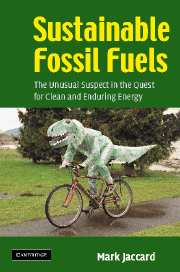Book contents
- Frontmatter
- Contents
- List of figures
- List of tables
- Preface
- Acknowledgments
- 1 What is energy sustainability?
- 2 Is our current energy path sustainable?
- 3 The prospects for clean secondary energy
- 4 The usual suspects: efficiency, nuclear and renewables
- 5 The unusual suspect: how long can fossil fuels last – and does it matter?
- 6 Can we use fossil fuels cleanly – and what might it cost?
- 7 Sustainable energy choices: comparing the options
- 8 Sustainable energy policy: how do we get there?
- 9 Broadening the definition: is sustainable energy sustainable?
- Bibliography
- Appendix ‒ synopsis and chapter reading guide
- Index
4 - The usual suspects: efficiency, nuclear and renewables
Published online by Cambridge University Press: 06 July 2010
- Frontmatter
- Contents
- List of figures
- List of tables
- Preface
- Acknowledgments
- 1 What is energy sustainability?
- 2 Is our current energy path sustainable?
- 3 The prospects for clean secondary energy
- 4 The usual suspects: efficiency, nuclear and renewables
- 5 The unusual suspect: how long can fossil fuels last – and does it matter?
- 6 Can we use fossil fuels cleanly – and what might it cost?
- 7 Sustainable energy choices: comparing the options
- 8 Sustainable energy policy: how do we get there?
- 9 Broadening the definition: is sustainable energy sustainable?
- Bibliography
- Appendix ‒ synopsis and chapter reading guide
- Index
Summary
The oil crisis and fossil fuel price shocks in the 1970s boosted the prospects for energy efficiency, nuclear power and renewable forms of energy. Each of these alternatives experienced a surge of investment in R&D, demonstration projects and commercialization efforts. Each became the focus of government policy initiatives and public utility programs, sometimes attracting large subsidies. As the 1980s progressed, however, the prices of oil, natural gas and coal fell back to their historic levels. Unable to compete with fossil fuels except in special circumstances, each alternative experienced stagnating investment and declining policy interest.
The emerging concern for sustainable energy in the 1990s, especially the focus on climate change among wealthier countries, produced a new window of opportunity for efficiency, nuclear and renewables, as advocates extolled their environmental virtues. Dramatic improvements in energy efficiency might eliminate the need for primary energy expansion, and even enable its contraction. Nuclear power produces clean electricity while emitting no local air pollutants, no regional acid emissions and no greenhouse gases. All renewables emit zero greenhouse gases and even biomass can be converted to electricity and hydrogen so that it too has zero local emissions. When the focus is a sustainable energy system, these are the “usual suspects.”
Energy efficiency
While energy efficiency is not a primary energy source, its potential contribution in the face of growing energy service needs was recognized three decades ago.
- Type
- Chapter
- Information
- Sustainable Fossil FuelsThe Unusual Suspect in the Quest for Clean and Enduring Energy, pp. 79 - 143Publisher: Cambridge University PressPrint publication year: 2006



